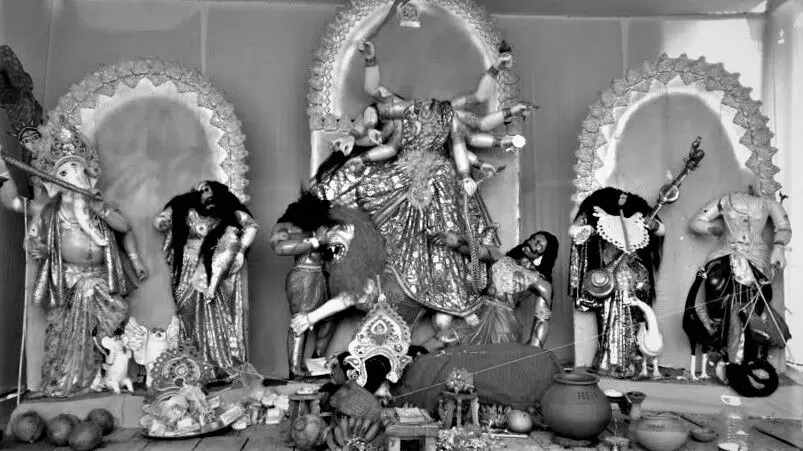Staving off communalism
It is high time that Bangladeshi intelligence agencies take a strict stand to stall the election-driven communal politics practised by nefarious elements in the country

In a shocking but not altogether surprising move, 14 Hindu temples in Thakurgaon in Bangladesh were vandalized on February 5 in a series of premeditated attacks. Nine idols in Sindur Pindi and four in the Collegepara area of Paria Union and 14 idols in a temple in the Sahbajpur Nathpara area of Charol Union were also desecrated. Unfortunately, as alleged by the victims, police have not been as active as they should have been. The Hindu community in Bangladesh, which is always in minority, is distressed by repeated assaults on their religion and deities by Islamic fanatics. According to them, in the latest incident, many idols were not only destroyed but were found thrown inside the pond waters near the temple. However, local leaders say that such communal violence targeting Hindu idols in this particular region is unprecedented and undermines interfaith harmony.
Meanwhile, the country’s Hindu social and cultural groups have angrily reacted to this incident calling for a fair and impartial investigation to bring the perpetrators to justice. According to leading politicians, the upcoming election scheduled this year has increased the chances of similar communal attacks to whip up a communal frenzy to disturb the tranquil and perhaps to polarize the vote bank. This is the handiwork of the fanatics who continue to play only politics of religion.
In the meantime, political campaigning for the next Bangladesh election is steadily entering a feverish pitch and the opposition Bangladesh National Party (BNP) has intensified its meetings and rallies. They are in a mood for provocation so that the law and order agencies unleash a crackdown on them or spark communal violence to discredit the present regime. Economic issues are highlighted time and again and the opposition, in their rhetoric, is raising apprehensions about a Sri Lanka-type economic meltdown to confuse the electorate. On its part, the ruling Awami League (AL) has started projecting its achievements in the preceding five years outlining the development projects, construction of Padma Bridge, and effective control over crime and law and order situation. AL has also highlighted in its progress report various successes attained on its external policies maintaining harmonious relations with many countries including the ones in the neighbourhood. AL also claims, while assuring the people, that the 2024 elections will be peaceful, inclusive yet competitive. However, critics of AL feel that while development works in Bangladesh have shown stellar results and average income and life expectancy have increased, development alone may not win popularity or people’s confidence. According to them, people want further freedom of speech, freedom of thought and freedom of media. AL leaders are hopeful that over the past 14 years, they have taken the country along the development highway, and that the people will spontaneously vote for them to retain office in the next elections.
On the whole, this time election is bound to be tough according to Dr Syed Mudassar Ali, a well-known Bangladesh academic and an election analyst. He recommends that the onus is now on the people of Bangladesh who should collectively join hands to consolidate the developmental gains. In other words, much will not help if the people look up only to the Prime Minister and ruling party leader Sheikh Hasina instead, they need to comprehend the directions given by her and convert the given roadmap into votes. Corruption is the other issue which is likely to dominate electoral politics ahead of the elections. Opposition is certain to exploit this issue as this menace has seeped deeply into the Bangladesh system of administration and it looks like an uphill task to extricate it from the body politic.
All said and done, the anti-social elements in Bangladesh are looking for an opportune movement to capitalize on the communal situation to vitiate the peaceful atmosphere, divide the society, and sow seeds of discord to blame Hasina for her alleged pro-India and pro-minority policies. In this regard, the seculars, the progressive civil rights groups and the intelligentsia must play a pivotal role in keeping the communal elements in check ensuring the deserving party is victorious to defeat the regressive forces for a strong and secular Bangladesh maintaining warm relations with India and other countries.
On February 15, bilateral talks and review meetings between India and Bangladesh were held and was headed by Indian Foreign Secretary, Vinay Mohan Kwatra and his Bangladesh counterpart, Masud Bin Momen. Both sides discussed and reviewed the entire gamut of bilateral ties and cooperation.
As heat is gradually occupying the political space ahead of the parliamentary elections, the European Union (EU) and its member states have strongly deplored the political violence gripping Bangladesh. This came in the wake of an EU delegation on its recent Dhaka visit. Further, it is believed but not yet corroborated that the EU, the UK and the US are tacitly supporting the opposition BNP to ensure its victory chances though appear dim.
The writer is Adviser NatStrat, a security analyst and a former National Security Advisor in Mauritius. Views expressed are persona



